Published on: March 14, 2023
Written by Eric Devin / Fact-checked by David Rowan
Growing a vegetable garden is a great way to take control of what you eat, reduce your carbon footprint, and enjoy the many benefits of gardening. It doesn’t matter whether you have a big backyard or a small balcony – anyone can grow their own vegetables at home. With the ongoing pandemic, more and more people are turning to garden as a way to stay active and productive while also ensuring access to fresh produce.
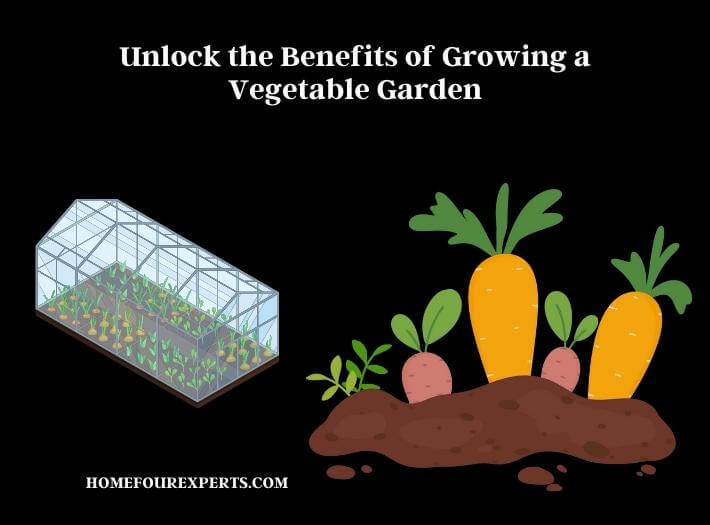
But growing your own vegetable garden isn’t just about convenience – it’s also an opportunity to improve your health and well-being. Not only will you have access to fresh, nutrient-rich produce, but gardening itself can have physical and mental health benefits.
How to Grow a Vegetable Garden?
If you’re new to gardening, growing your own vegetable garden may seem daunting at first. But with the right tools and knowledge, it can be a fun and rewarding experience. Here are some tips to help you get started:
- Choosing the right location Select a location that receives at least six hours of sunlight per day and has good drainage. If you don’t have a yard, you can still grow a vegetable garden on a balcony or patio using containers.
- Preparing the soil should be rich in nutrients and well-draining. You can improve soil quality by adding compost or other organic matter. Test the soil’s pH level and adjust it if necessary.
- Selecting vegetables to grow to Choose vegetables that are suitable for your climate and soil type. Consider the amount of space you have and how much time you can dedicate to gardening. Start with easy-to-grow vegetables such as tomatoes, lettuce, and beans.
- Caring for the vegetable garden Water your garden regularly, especially during dry spells. Fertilize the plants as needed and remove weeds and pests. You can use organic methods to control pests and diseases, such as companion planting and crop rotation.
- Harvesting vegetables Harvest your vegetables when they are ripe and ready to be eaten. Don’t wait too long, or they may become overripe and lose their flavor. Some vegetables, such as tomatoes and peppers, will continue to ripen off the vine.
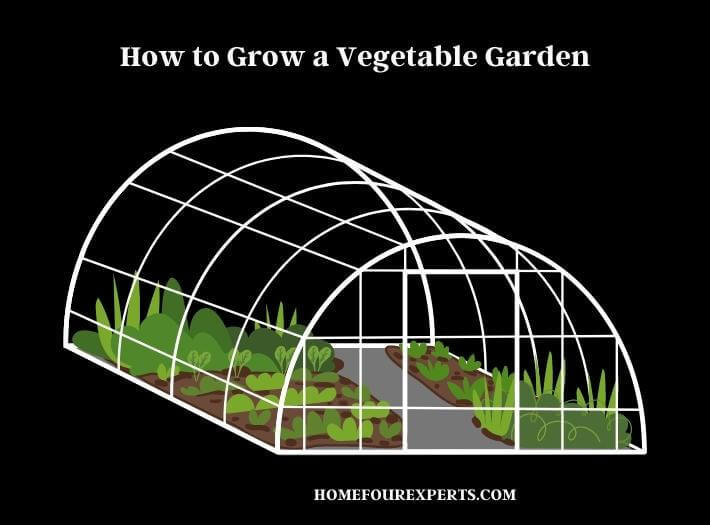
If you follow the tips, you can grow your own fresh and nutritious produce at home. Remember, gardening takes time and patience, so don’t get discouraged if things don’t go as planned at first. With practice, you’ll soon be enjoying the fruits (and vegetables) of your labor.
Health Benefits of Growing a Vegetable Garden
Growing a vegetable garden isn’t just good for the environment and your grocery bill, it can also benefit your health in a number of ways.
Gardening is a great form of exercise. It can improve strength, flexibility, and endurance, and burns calories. According to the Centers for Disease Control and Prevention (CDC), gardening for 30-45 minutes can burn around 150-300 calories.
Gardening can be a calming and therapeutic activity that reduces stress and anxiety. Studies have shown that spending time in nature and engaging in gardening activities can lower cortisol levels and improve mood.
Growing your own vegetables ensures that you have access to fresh, nutrient-rich produce. This can lead to improved health outcomes such as the reduced risk of chronic diseases like obesity, diabetes, and heart disease.
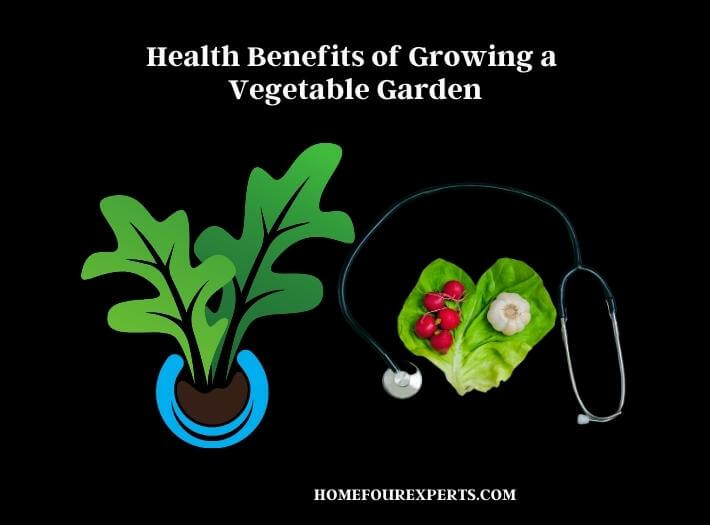
Spending time outside in the garden can increase exposure to sunlight, which is important for vitamin D production. Vitamin D is essential for healthy bones and immune function.
Gardening involves problem-solving, planning, and creativity, all of which can stimulate the brain and improve cognitive function. This is especially beneficial for older adults, who can benefit from activities that promote mental agility and social interaction.
Growing a vegetable garden can have many positive health benefits, both physical and mental. It’s a fun and rewarding activity that can help you stay active, reduce stress and improve your overall well-being.
Environmental Benefits of Growing a Vegetable Garden
Growing your own vegetable garden not only benefits your health but also the environment. Buying produce that is shipped from far away contributes to greenhouse gas emissions from transportation. Growing your own vegetables at home reduces the distance that food has to travel, thus reducing your carbon footprint.
Commercially grown produce is often sprayed with pesticides and herbicides, which can be harmful to the environment. By growing your own vegetables, you can avoid the use of harmful chemicals and use organic and natural methods to control pests and diseases.
Growing a variety of vegetables in your garden promotes biodiversity and provides habitats for beneficial insects such as bees and butterflies. This helps to maintain a healthy ecosystem and supports local biodiversity.
When you grow your own vegetables, you can harvest only what you need, reducing food waste. You can also compost any vegetable scraps or garden waste, which reduces the amount of organic waste that goes to landfills.
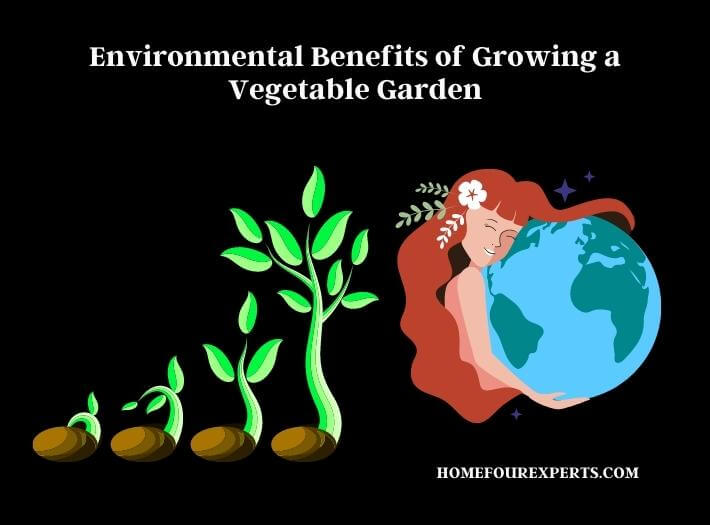
Watering your garden is important, but when you grow your own vegetables, you can conserve water by using drip irrigation or watering early in the morning or late in the evening when evaporation is lowest. Additionally, growing your own vegetables can reduce the amount of water used to grow and transport food to your local grocery store.
Growing a vegetable garden has many environmental benefits. It reduces your carbon footprint, promotes biodiversity, reduces food waste, saves water, and reduces the use of harmful pesticides and herbicides.
Financial Benefits of Growing a Vegetable Garden
Growing your own vegetable garden not only benefits your health and the environment, but it can also have financial benefits.
Growing your own vegetables can save you money on groceries. When you grow your own vegetables, you can avoid the cost of buying produce at the grocery store, which can be expensive, especially for organic produce.
A well-maintained vegetable garden can increase the value of your property. It can add curb appeal and make your home more attractive to potential buyers, which can translate into a higher resale value.
If you have a large enough garden, you can sell your excess produce at a local farmers market or to your neighbors. This can provide you with an extra source of income.
Eating a diet rich in fresh vegetables can help reduce the risk of chronic diseases such as obesity, diabetes, and heart disease. By growing your own vegetables, you can improve your diet and potentially reduce healthcare costs in the long run.
The physical health benefits, of growing your own vegetable garden can improve your mental health. It can provide a sense of accomplishment and purpose, which can help reduce stress and anxiety. This can ultimately lead to better decision-making and potentially better financial decisions.
It’s important to know how you brew your own beer. Click here to know the process.
Importance of Growing a Vegetable Garden
Improves health Growing your own vegetables provides you with fresh and nutritious produce that is free from harmful chemicals and pesticides. A diet rich in fresh vegetables can help reduce the risk of chronic diseases such as obesity, diabetes, and heart disease. Additionally, gardening is a physical activity that can provide exercise and improve overall health.
Supports the Environment
Growing your own vegetables reduces your carbon footprint, promotes biodiversity, and reduces the use of harmful pesticides and herbicides. It can also reduce food waste and conserve water.
Promotes Self-sustainability
Growing your own vegetables promotes self-sustainability and reduces your reliance on outside sources for food. It can also provide a sense of independence and self-sufficiency.
Provides a Sense of Community
Growing a vegetable garden can bring people together and promote a sense of community. You can share your excess produce with your neighbors or donate it to a local food bank, which can help those in need.
Teaches Valuable Skills
Growing a vegetable garden teaches valuable skills such as planning, planting, and harvesting. It can also teach children about where their food comes from and the importance of taking care of the environment.
Tips for Growing Vegetables at Home
Growing vegetables at home can be a rewarding and enjoyable experience. Here are some tips to help you get started:
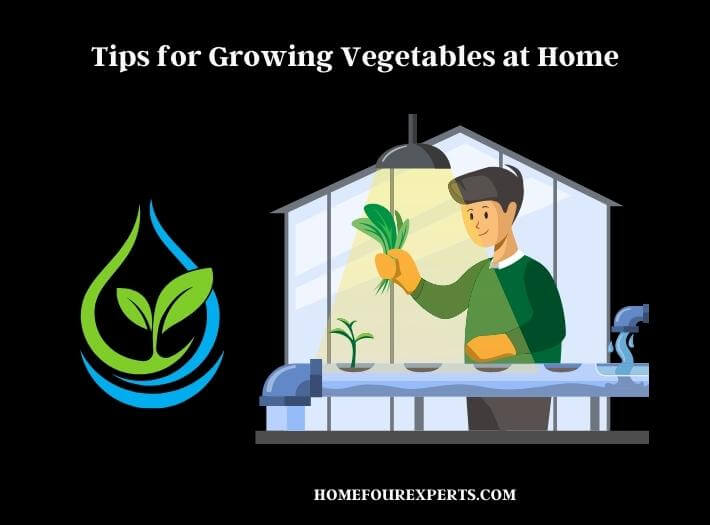
- Choose a location for your vegetable garden that receives at least 6 hours of sunlight per day and has well-draining soil. If you don’t have enough space in your yard, consider growing vegetables in containers on a sunny patio or balcony.
- If you’re new to gardening, start with easy-to-grow vegetables such as tomatoes, lettuce, and radishes. These vegetables are relatively low maintenance and can be grown in a variety of growing conditions.
- Use high-quality soil that is rich in organic matter and nutrients. You can purchase soil mixes or make your own by combining compost, peat moss, and vermiculite.
- Water your vegetable garden regularly, especially during hot and dry weather. Most vegetables require at least 1 inch of water per week. Use a watering can or hose with a gentle nozzle to avoid damaging your plants.
- Keep an eye out for pests and diseases that can damage your plants. Use natural pest control methods such as companion planting, handpicking pests, and applying organic pesticides when necessary.
- Harvest your vegetables regularly to encourage continued growth and to prevent over-ripening. Use a sharp knife or scissors to cut vegetables from the plant.
- Rotate your crops each year to prevent soil-borne diseases and promote healthy soil. Avoid planting the same vegetables in the same spot year after year.
Social Benefits of Growing a Vegetable Garden
Growing a vegetable garden can bring people together and encourage community engagement. It provides a common interest that can be shared among neighbors and friends, and can even lead to community gardening projects and events.
Growing your own vegetables can promote healthy eating habits, not just for you but for others as well. Sharing your produce with neighbors or donating it to local food banks can help to improve access to healthy food in your community.
Successfully growing your own vegetables can provide a sense of accomplishment and pride in your abilities. Sharing your successes with others can also help to foster a sense of community and connection.
Growing a vegetable garden can provide opportunities for education, both for yourself and for others. You can learn about different plants and growing techniques, and share that knowledge with others who may be interested in starting their own gardens.
Reduces stress and promotes relaxation Spending time in your garden can be a relaxing and stress-reducing activity. It provides an opportunity to connect with nature and take a break from the stresses of daily life.
Wrap Up
Growing a vegetable garden is a fulfilling and rewarding experience that can provide you with fresh and nutritious produce. Not only does it offer health benefits, but it also has environmental and financial benefits.
Whether you choose to grow organic vegetables or use conventional methods, the act of growing your own food can bring you closer to nature and promote a sense of self-sufficiency.
About This Writer

Hi, I am Eric Devin and I am a professional interior architect. Since childhood, I've always enjoyed DIY projects! And, I have loved to solve simple household problems using essential tools and equipment. I have also acquired a lot of information about basic household tools settings by working with contractors.